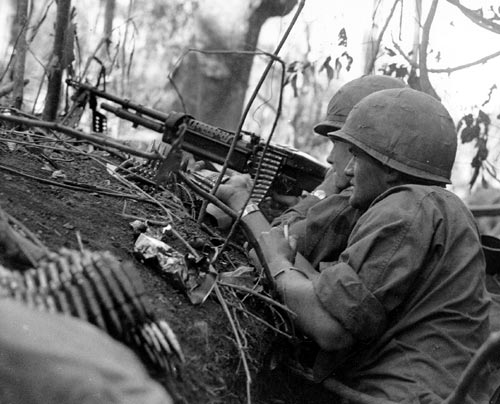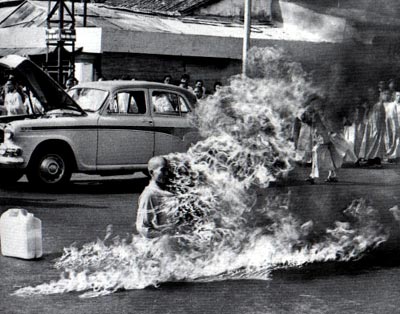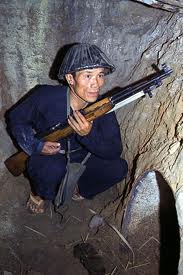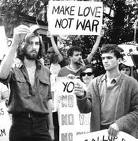The Causes of Woodstock |
||
 The Vietnam War was one of the two main bloody battles of the Cold War.  After this photo of a monk's self-immolation, international outrage was sparked and Diem was quickly overthrown.  The Vietcong were comprised mostly of peasants fighting for their homes; they specialized in guerrilla warfare.  As the war progressed, more opposition for it grew in the United States. Woodstock was a peaceful protest for the war underneath all the drugs and sex. |
Woodstock was originally a commercial endeavor financed by John Roberts and Joel Rosenman in the assumption that there was a profit to be made. Eventually, it became a free concert, and so there was little profit actually made. The sentiment of the festival became more about peace, and tickets, fences, greed, and selfishness were forgotten. At the time of the festival, the Vietnam War was raging in full force, and it was gaining more and more opposition in America. Woodstock became a non-violent protest to the Vietnam War. The people who came supported peace and wished for the end of war. While many believe Woodstock was simply a gathering of hormone driven teenagers only interested in sex and drugs, the true feelings of the festival were peaceful, anti-war sentiments. The Vietnam War was a Cold War Era conflict in which the United States supported Ngô Đình Diệm, a corrupt dictator focused on gaining more power. He refused to hold democratic elections because he was afraid he would lose in them, and he refused to accept Communism because he wanted to retain his hold of power and the support of America. Despite being a cruel dictator, the United States supported him rather than the Communist, Northern leader. The leader of the Communist, Ho Chi Minh, was a relatively benevolent leader compared to Diem, so the majority of Vietnam supported Minh. The only reason the United States supported Diem is because he was anti-communist. Thus, the people of Vietnam began to view the United States as a supporter of dictatorships and the cruel dictator, Diem. Deaths numbered in the thousands for both sides of the war, and many soldiers fell to guerrilla warfare tactics. The war gathered huge opposition in the home front, especially after the Tet Offensive. The Tet Offensive was an attempt by the communist North of Vietnam to take out the southern opposition in one blow. While the attack caught the United States and southern Vietnam off guard because it was on a holiday where the southern forces were completely unprepared. However, most of the attacks were beaten down and ended up as a loss for the guerrilla forces of the North. The Northern forces took huge losses, and militarily, the Tet Offensive was a major loss. But the attack had huge psychological repercussions on the American home front. The battle convinced us that we were fighting a losing battle, and opposition for the war grew exponentially. The anti-war sentiment grew and became represented in the counterculture of the hippies. The peace loving sentiments of the hippies spread and eventually led to the Woodstock festival, an accumulation of the frustrations of the war. The hippies that attended the festival were eventually classified as the drug and sex crazed kids of the era. Many people fail to realize that, underneath the hedonistic pleasures, the true motive was an end of war, and a desire for peace and generosity. |
|